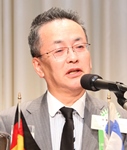Future Prospects of the Abe Administration and its Three Risks
March 26, 2014
Mr. Yasuhiro Tase
Journalist
�� The Abe Administration enjoys a seemingly high approval rating with favorable economic performance since coming into office at the end of 2012. If we take a closer look, however, there awaits three risks regarding foreign diplomacy, internal politics and Abenomics economic policies.
The Abe Administration enjoys a seemingly high approval rating with favorable economic performance since coming into office at the end of 2012. If we take a closer look, however, there awaits three risks regarding foreign diplomacy, internal politics and Abenomics economic policies.
��Let me start with the risk of foreign diplomacy. The G8 framework was constructed after the collapse of the Cold War that paved the way for Russia to join. The recent annexation of Crimea has raised protests against Russia and led to its demise. Prime Minister Abe, caught in the quicksand of foreign diplomacy, hoped to finally resolve the issue of the Northern Territories by the end of this year. He has already met with President Putin five times, yet their 6th meeting scheduled this March to take place in the Hague during the Nuclear Security Summit was cancelled because Russia did not participate. Japan decided to stand with the West regarding sanctions on Russia, while it pledged financial aid worth 150 billion yen to Ukraine. Today, the relations between Japan and Russia have changed dramatically.
��Against this backdrop, Prime Minister Abe sought ways to improve relations with North Korea and to find a breakthrough to the abduction issue. What we saw, however, was North Korea launching missiles right after the leaders of Japan, US and South Korea met in the Hague for talks. Also, the movements of China after the G8 collapse made us realize how intricate and deep-rooted diplomatic issueswere.
��We have to question whether the Abe administration is skilled to handle such complicated issues. I am rather skeptical as we occasionally witness signs of distrust by the Obama administration against our government. I must say the Japan-US relation has been strained by Prime Minister Abe��s visit to the controversial Yasukuni Shrine late last December, despite the strong warning by the US prior to his visit. Prime Minister Abe underestimated the serious foreign policy consequences of such an insensitive visit.
��What is for sure is that President Putin will not change his stance on instigating nationalism to maintain domestic political stability. He now holds an enormous 80-percent approval rating that has soared with the Sochi Winter Olympics and now with the annexation of Crimea. With the 2018 re-election in mind, President Putin will maintain his firm stance and thus, solving the issue of the Northern Territories seems almost hopeless. Relations with Russia will also have an enormous impact on the Japanese economy, as we import oil and natural gas from them that accounts for 10% of the total.
��Now, let me move to the second risk of internal politics. So far, there have been remarkably few Liberal Democratic Party (LDP) Diet members who have made a public protest against Prime Minister Abe��s political tactics, ideas or stance. Yet, we are observing some signs that could shake the government��s political footing, as Prime Minister Abe attempts to alter the interpretation of the Constitution enabling our country to be engaged in collective self-defense during this Diet session. The LDP ruling coalition partner, the New Komei Party, has been expressing strong reservations as it will jeopardize the party��s pacifist principles. They could even decide to leave the coalition, as they fear the LDP hastens to draw a conclusion. We are also seeing some liberal LDP Diet members starting to raise their voices, in support of the New Komei Party.
��Prime Minister Abe is likely to reshuffle the Cabinet after the current regular Diet session gets prorogued this June. He has to take in account various factors in selecting the Cabinet ministers, including the appointment of big-name LDP members waiting to be appointed, proactive appointment of female members, paying special attention to the House of Councilors and the New Komei Party. I must say this reshuffle can become the second risk for the current administration, as the timing coincides with economic uncertainties caused by the third risk of Abenomics economic policies.
��The consumption tax raise from 5% to 8% this April will surely bring down GDP for the April-June quarter. The question is what the figure will be for the July-September quarter, due out in November. It will be a key data to determine whether the government will further raise the consumption tax to 10%. The government is quite optimistic that the hefty supplementary budget worth 5.5 trillion yen will offset the negative impact. Yet we cannot overlook the fact that there are conflicting views shared among the Cabinet members that could raise risks of Abenomics, coupled with domestic politics.
��There are other economic risk factors. One is that export growth has been less than expected, despite the yen depreciating by 20 yen from the start of the Abe administration. While some companies benefit from yen depreciation, over 30% of companies opted to move their production bases overseas to mitigate its negative impact. As the yen has weakened, the cost for imported raw materials has risen. Another major risk is how the world markets will react to our government bonds that total nearly 200 trillion yen. Also, the monetary easing policy has obviously driven the share prices higher that has expanded assets and eventually widened the gap between the haves and the have-nots. So far, Abenomics has delivered mostly higher living costs for the Japanese consumers. Workers at small and midsize firms, which account for 70% of the total labor force, are left out of the wage and bonus increases.
��In light of these three risks, I must say Prime Minister Abe has to overcome various challenging issues.